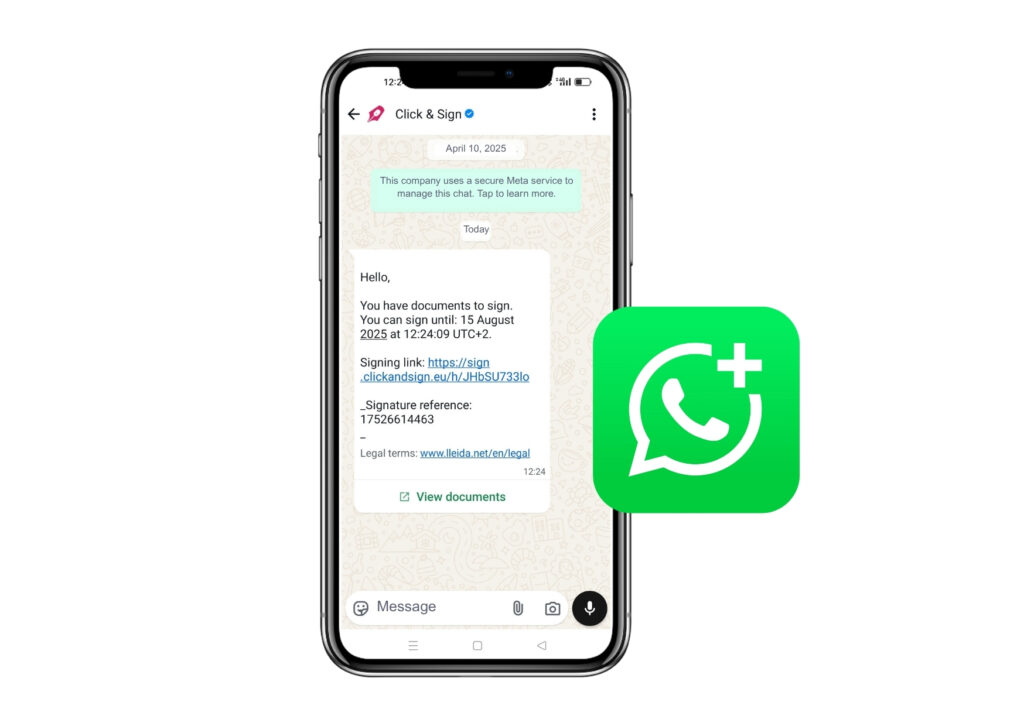We launched our electronic signature solution more than ten years ago. Since then, thousands of clients have transitioned from handwritten signatures to our digital alternative, which strengthens the security of their processes and improves their conversion rates: 78% of signatories access the signing page in under an hour. The use of WhatsApp electronic signatures is expanding rapidly across regulated industries within the European Union. However, their legal validity is not automatic — it depends on the method of implementation and whether a qualified trust service provider is involved in the process.
Traditionally, documents have been delivered for signature via email or SMS. However, in an increasingly immediate environment, accessibility has become just as crucial as security. Reflecting this, we have taken a significant step forward: the integration of WhatsApp as a new delivery channel.
This is not a hypothetical development — it is already operational. Organisations across multiple sectors — including finance, real estate, logistics, insurance and agri-food — have adopted this functionality as part of their workflow, embracing the convenience of immediate, mobile-first signing.
Table of contents
Key benefits of WhatsApp electronic signatures for secure document workflow

- Customised and Meta-verified sender identity, which enhances trust and communication credibility (including identity verification badge).
- End-to-end process personalisation: the sender name and signature page can be customised to include corporate branding and logos.
- Guaranteed international coverage, enabling secure transmission to foreign mobile numbers.
- Mobile-optimised experience, with no app installation required. Signatures are carried out directly through WhatsApp, with an average response time of under 15 minutes.
- Legal validity ensured by Lleida.net as a Qualified Trust Service Provider.
- End-to-end encrypted document handling, ensuring maximum security and preventing manipulation.
- Centralised and traceable management via back office.
- Automatic notification and reminder configuration to increase responsiveness and expedite signature cycles.
The legal evidential value of WhatsApp messages in Spain

Pursuant to Article 324 of the Spanish Civil Procedure Act (Ley de Enjuiciamiento Civil – LEC), a WhatsApp message may qualify as private documentary evidence. However, its acceptance in judicial proceedings is conditional on the fulfilment of specific legal requirements:
- Authenticity: it must be demonstrated that the message has not been manipulated or altered.
- Identification of the parties: the identities of the sender and recipient must be reliably established.
- Integrity of the content: the message must be presented in its entirety, without omissions or modifications.
Accordingly, although a WhatsApp message may be admitted as private documentary evidence, its probative strength is limited, given that:
- It may be contested on grounds of potential alteration.
- It frequently requires supplementary evidence, such as expert reports, notarial instruments or witness testimony.
- It does not benefit from any presumption of authenticity or content integrity.
The Spanish Supreme Court, among others, has established clear precedents in this regard. In particular, Judgment STS 300/2015 affirms that, in cases where the evidence is challenged, the burden of proof lies with the party presenting the message, who must substantiate its authenticity and integrity through supporting documentation.
The role of a Qualified Trust Service Provider in evidentiary assurance
Involving a Qualified Trust Service Provider (QTSP), such as Lleida.net, adds a significant layer of legal reliability to the process of gathering and preserving digital evidence.
Lleida.net certifies:
- The integrity of the message content
- The identity of the sender and recipient
- The exact date and time of transmission and access
In addition, Lleida.net can securely store the message and associated metadata in accordance with legal retention obligations.
As a QTSP under Regulation (EU) No. 910/2014 (eIDAS), Lleida.net issues evidence certificates that enjoy legal presumption of validity and full legal effectiveness across the European Union. This is due to compliance with the stringent technical and legal requirements established under the Regulation.
Mitigating the risk of rejection or invalidation of evidence
One of the major benefits of working with a qualified provider is the substantial reduction in the risk of your digital evidence being declared inadmissible or void — a common occurrence when digital messages lacking certification (e.g. screenshots) are presented in court.
By involving a QTSP, the legal and technical robustness of the evidence is significantly enhanced, making it far more difficult for opposing parties to discredit it.
The evidential value of electronic signatures executed via WhatsApp
The probative strength of a WhatsApp electronic signature depends on how it is executed and the legal framework in which it is presented.
Generally, it would fall under the category of a simple electronic signature, as defined in Regulation (EU) No. 910/2014 (eIDAS). This would include scenarios such as:
- Sending an image of a handwritten signature
- Expressing consent via text, such as “I accept”
- Drawing a signature with a finger on a touchscreen
In such cases, the evidentiary value is modest. While such forms may carry some legal weight, they do not benefit from presumptions of authenticity or authorship and typically require supporting material such as expert testimony or a notarial act.
Conversely, when the signature is carried out through a qualified provider — such as Lleida.net via Click & Sign — the resulting signature is fully legally valid. In cases where a qualified electronic signature is applied, its legal status is equivalent to that of a handwritten signature, pursuant to Article 25 of the eIDAS Regulation.
Lleida.net incorporates a full range of safeguards — encrypted channels, one-time passcodes (OTP), traceability, and access controls — thereby greatly enhancing the legal standing of the signed document and reducing the scope for dispute.
One provider, one compliant onboarding framework
Thanks to the technological integration Lleida.net offers, it is possible to configure a comprehensive and unified user journey, bringing together all services into a single legal and operational process. This reduces the risk of operational error and ensures compliance with applicable legal standards, all under the control of a single provider.
From video identification, digital certificate issuance, and biometric facial recognition, to two-factor authentication via SMS, email or WhatsApp, and legally binding electronic signatures — each phase of the onboarding journey can be fully customised and integrated into your existing systems.
At every step, Lleida.net ensures the generation of legally valid digital evidence.
Would you like to explore how to implement WhatsApp-based signatures in your organisation?
To learn how WhatsApp electronic signatures can be implemented securely and in full compliance with EU law, contact our team for personalised guidance.
